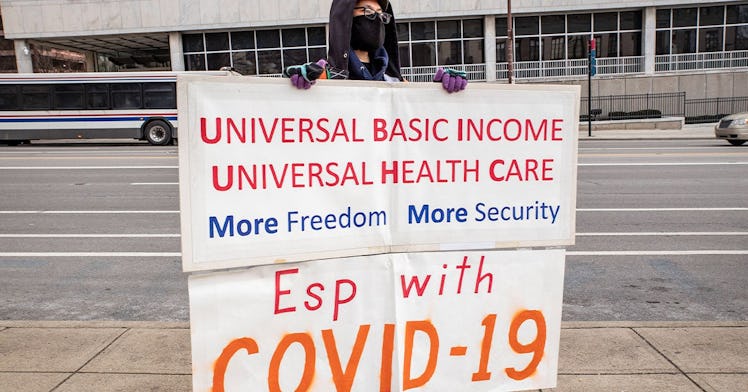These People Will Get $500 a Month for an Entire Year
Chicago will test pilot one of the largest basic income programs ever.

The city of Chicago will provide $500 every month to 5,000 low-income families for the entirety of 2022, in one of the nation’s largest tests of a basic income policy.
Insider reports that the measure passed the city council via next year’s budget, with support from Mayor Lori Lightfoot, the publication notes.The program will only apply to 5,000 people, chosen at random, all of whom make less than $35,000 per year.
According to the Living Wage Calculator from MIT, $35,000 per year is not considered a living wage for many people with children in Cook County, Illinois, home to Chicago’s 2.7 million residents. Many people likely earn even less — someone working full-time (2080 hours/yr) at minimum wage ($15/hr in Chicago) would make only $31,200 per year, and that’s not counting part-time workers or people who can’t work.
This program would add a total of $6,000 more dollars to someone’s income — a significant increase for many low-income families. And that money could go far. The Washington Post points to a 2019 report commissioned by the mayor’s office noting that about 18% of Chicagoans were living in poverty. Since then, the minimum wage has increased to $15 per hour, but many people have also been hit by the economic stagnation of the COVID-19 pandemic. To help alleviate poverty, that same report suggested launching a basic income pilot program, which the city has now done.
This new basic income initiative will only affect a fraction of Chicago’s families. But it’s also part of a larger wave of basic income test programs around the world, including other cities in the United States. Cities such as Stockton, California, Saint Paul, Minnesota and Richmond, Virginia have all worked on basic income test programs. In Stockton, the program led to higher employment levels and better mental health, with many people spending the money on things they needed — like food.
On a federal level, while the government hasn’t tested a basic income policy specifically, the expanded current child tax credit (CTC) passed as part of the coronavirus relief agenda has amounted to a basic income for many parents.
The program — in which many families receive direct payments for each child to the tune of several hundred dollars a month — has proven to be a major lifeline for poorer families across the country after the expansion. Many families making less than $35,000 per year have used the extra money on things like childcare, food, rent, and utilities, according to the Center on Budget and Policy Priorities, a left-leaning think tank. It’s reduced poverty and hunger in children in just the few short months it has been disbursed.
Despite this success, the CTC expansion will likely only be extended by one year, as plans for a new spending bill among Congressional Democrats have devolved amid pushback from more conservative members of the party like Senator Joe Manchin.
Yet the initiative has remained popular — and some analysis has shown that extending the CTC further could cut child poverty almost in half. And while more direct basic income programs such as Chicago’s are still in their infancy, they also speak to the potential power of using more universal, direct payments to support families trying to pay rent and keep their children fed.
This article was originally published on